
|
Isaiah 50:4-7
|
Philippians 2:6-11
|
Luke 22:14 – 23:56 // Luke 23:1 – 49
|
 Today we celebrate Palm Sunday, also called Passion Sunday. It introduces us into Holy Week, during which we commemorate the chief mysteries of our faith and contemplate the words and deeds of the Lord in the last days of his earthly life. Today we celebrate the triumphant entrance of Jesus into Jerusalem to accomplish the great mystery of redemption through his Passion, Death, and Resurrection.
In simplicity of faith, let us now join the procession of the children of Jerusalem to acclaim, honor and praise Christ our King and Lord. Let us welcome him into our hearts and homes so that he may rule and govern our lives.
Jesus is the King that comes not to dominate, but to serve and to give his life as a ransom for the human race. That is why, after the joyful procession, today’s liturgy changes the liturgy of his Passion.
The Passion of Jesus is the supreme sign of love and mercy of the Father. After the drama of so much love and so much suffering, the crowd went back beating their breast. In the story of the Passion, the divinity of Jesus remains hidden; instead, the suffering servant is manifested in all his pain and misery.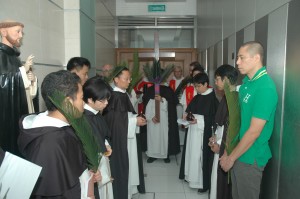
The same Jesus, who escaped from the crowd which wanted to make him king, today accepts to be honored and we join him in his triumphal entry in Jerusalem. The humiliation of Christ is contrasted with the highest honor. But how fickle this world is! Those who acclaim Christ today as King will cry for his blood within a few days!
The lowliness of Christ as the servant and his majesty as the Lord both appear in today’s liturgy. He enters the city humbly, on the back of a donkey. He is acclaimed by exalting crowds, but his earthly glory is short-lived. His Kingdom is not of this world. The red carpet treatment the people give him ultimately contributes to his condemnation.
In the suffering Christ we discern the human spirit buffeted by enemies, but still loyal to the Lord God. He chose to be humiliated one for the sake of all the lonely ones whom he has served. The depth of his abasement is the point at which Christ is fully the man of others. He became a brother and a servant of all, even to the extent of suffering and dying for them. He emptied himself: he was one like us, one with us and one of us in all things, except in sin. He died a shameful and miserable death, and this man was God. We have a God who died for us and has become a source of life for us. He lives and gives life. By his wounds we are healed.
The life and death of Christ have not only benefited our human life on earth, it has changed our very purpose in life, our relationship with God and opened the gates of heaven for us.
Millions of our brothers and sisters, through no fault of their own, have not yet heard the Good News of God’s infinite love for them; but God will find his way of extending the benefit of his love for them. There are also millions who have heard the Good News of Jesus and rejected it; God knows how to be merciful to them, too. But what about us, professed followers of Christ? During this Holy Week we should be repeatedly reminded of what God has done and is continuing to do for us. We can only beat our breast in humble contrition, for we are unworthy of the infinite love of God.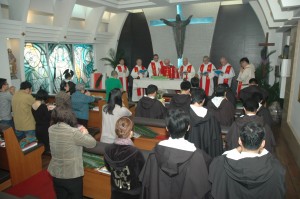
If we did not offend Jesus openly as the soldiers did on Calvary, or Pilate that condemned the innocent Christ for fear of the Jews, or Judas Iscariot that betrayed him for thirty pieces of silver; we may have done so indirectly by our indifference and negligence. Are we much better? How often have we offended him for similar motives? And we have no excuse, for we should know better than they, as to what Christ means for us.
 Fr. Dionisio Cabezón, O. P.
St. Dominic’s Priory
 Macau, March 23, 2013

 (On February 28, 2013, the Faculty of Christian Studies of the University of Saint Joseph organized a simple Round Table on Benedict XVI. The professors that intervened are the following: Fr. Peter Stilwell, USJ Rector, and professor of dogmatic theology; Professor Anna Chan USJ Vice-Rector and professor of Liturgy, Fr. Joao Eleuterio, Dean of the Faculty of Christian Studies and professor of dogmatic and patristic theology, Professor Arnold Monera, Professor of sacred Scriptures, Fr. Franz Gassner, SVD, professor of philosophy an ethics, and Fr. Fausto Gomez, OP, professor of theology and social ethics. Each participant spoke of the influence of Benedict XVI particularly regarding his field of teaching. We present here the intervention of our own Fr. Gomez)
We were going to take supper when we heard the incredible news: Pope Benedict XVI is resigning as Pope! It was the evening (Macau time) of February 11, 2013, the Feast of Our Lady of Lourdes and the International Day of the Sick when the Pope announced his resignation as Supreme Pontiff of the Church to take effect on February 28 at eight in the evening (8:00 PM). After supper we all rushed to watch CNN for more specifics on the history-making news. Why is Benedict XVI resigning? The words of Benedict XVI: “After having examined repeatedly my conscience before God, I have come to realize with certitude that my strength, due to advanced age, is not enough to carry out appropriately the Petrine ministry†(Address to Consistory, February 11, 2013). At first, the unexpected news of the papal resignation seemed incredible, shocking, saddening! Then, most of us thought that the resignation was an extraordinary act of humility and service to the Church, and a singular act of courage.
A few days later, on February 14, I had to go to Rome for the Annual Assembly of the Pontifical Academy for Life (PAV), which usually celebrates its yearly meeting at the end of February. This year the encounter of about one hundred and twenty PAV members from all over the world took place on February 21-23, and focused on the theme “Faith and Life.†The 2013 meeting with international congress (February 22) had an added interest: the PAV sessions take place at the New Synod Hall inside the Vatican, where the Cardinals, including those over eighty, will meet before the coming Conclave. Moreover, the lunch of the three-day assembly is prepared at Sancta Martha, also inside the Vatican, which will be the residence of the Cardinals during the Conclave. I asked some PAV members how they felt after hearing the news of the Pope’s resignation. Let me quote two representative answers. One bishop from Australia told me: “I felt sadness, I was so surprised!†A well-known German philosopher said to me: “I could not believe it; I felt disappointed. Why did he resign? It is a mystery.†He added: “We are grateful to Benedict XVI, now we pray for the Cardinals.â€Â I said: “I believe in the Holy Spirit.†He said: “Yes, I do too, but we have had a few bad popes, so we pray that the cardinals will understand the language of the Holy Spirit and follow his inspiration.† Personally, after hearing the news of the papal resignation I felt sad, then grateful, and then hopeful!
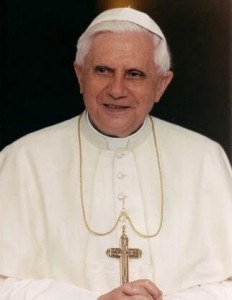
After poorly digesting the news of the papal resignation, the next question many asked was on the heritage or legacy of the papacy of PopeBenedict XVI. For many people, his main message is his life: a coherent, lucid, humble and prayerful life (through the last days of his Pontificate he looks so serene, so at peace with himself, so grateful and compassionate, and so joyful. The Pope’s last twit of February 28: “I wish that each one of you experiences the joy of being a Christianâ€). Most people concerned agreed that his legacy is his magisterium, his clear and profound teaching on faith and morals. For me personally I treasure his three encyclicals focused on the close relationships of the virtues, in particular of faith, hope and charity, and truth and justice: Deus Caritas Est (On Christian Love, 2005), Spe Salvi (On Christian Hope, 2007) and Caritas in Veritate (On Integral Human Development in Charity and Truth, 2009). Pope Benedict XVI also left us two important Apostolic Exhortations: Sacramentum Caritatis (on the Holy Eucharist as the Source and Summit of the Church’s Life and Mission, 2007), and Verbum Domini (On the Word of God in the Life and Mission of the Church, 2010). Among other significant messages speeches, homilies, Angelus, etc.,I point out his Message for the World Day of Peace, January first of every year. These yearly messages complement his rich social teachings on justice, love and social ethics. Moreover, we cannot but underline the three books on Christ that he wrote during his papacy, books not of Benedict XVI but of Joseph Ratzinger the theologian, who is classified as a neo-Augustinian, ardent follower of St. Augustine, St. Bonaventure and Hans Urs von Balthasar. All the writings and messages of the Pope, including his acclaimed Light of the World (A Conversation with Peter Seewald, 2010)  are centered on Christ, the Way, the Truth and the Life of every believer and of every person, and also on the human person, the center of morality. It is interesting to note that Benedict XVI likes to speak of a morality or ethics only, not of two as many like to do: life ethics and social ethics. He says that there is only one morality, one ethics because the human person, an individual and a social being is the subject and the center of all ethics.
Certainly, Vatican II continues to be the most significant event of the Church since last century. We owe to Pope Benedict XVI the calling of the Year of Faith (2012-2013) to celebrate the 50th anniversary of the beginning of the Second Vatican Council (1962-1965). For him – for us – Vatican II is, as Blessed John XXIII said, “A great grace and a sure compass.†Benedict XVI urges us to renew our faith and help renew our Church: “If we interpret and implement it (Vatican II) guided by a right hermeneutics, it can be and can become increasingly powerful for the ever necessary renewal of the Church†(Address to the Roman Curia: December 22, 2005).
While in Rome and the Vatican, another question propped up: What will Pope Emeritus Benedict XVI do? The Pope himself answered when he announced his abdication: “I wish to serve with my whole heart with a life dedicated to prayer.†He made it clearer in subsequent messages. I heard him say it again from the balcony of his apartment on his last Angelus on February 24. Before a crowd of two hundred thousand people, mostly young (and some oldies, like me) filling St. Peter’s Basilica Plaza Pope Benedict XVI said: “The Lord is calling me to dedicate myself still more to prayer and to meditation.†And he added: “But this does not mean abandoning the Church; on the contrary God asks this of me, to serve the Church with the same dedication and love…, but in a way that is more adapted to my age and my strength.†On the last audience of February 27 the Pope said: “I am not abandoning the cross, but remain in a new way with the crucified Lord. I no longer carry the power of the office for the government of the Church, but in service of prayer I remain, so to speak, within St. Peter’s bounds.â€
Usually, the members of the Pontifical Academy for Life (PAV) have a papal audience. The members were always eager to hear the words of the Holy Father on the defense and promotion of human life. This time, the audience was cancelled a few weeks earlier. After knowing the news on the resignation, it was understood why this year there would be no papal audience. Instead the members were offered a guided visit to the Vatican Museum. It was truly worthwhile! Worthwhile in itself: there is so much to see, to admire, to enjoy, in particular the paintings of Raphael and, above all, Michael Angelo. Worthwhile also at this interesting time: The election of a new Pope! This election, as we all know, takes place at the Sistine Chapel, which was the last part of our visit to the Vatican Museum. In this chapel the election of the new Pope will take place soon. We admired Michel Angelo Last Judgment, and relished walking on the floor of the Chapel and learning where the place for the chimney would be – the chimney that will be fed with synthetic material and tell the world of the result of the votation every morning and evening: black smoke, no pope; white smoke, Habemus Papam!
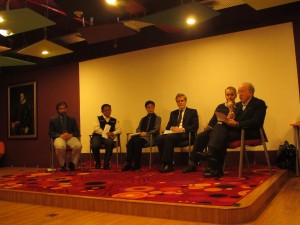
I remember a few of the many quotable texts of Pope Benedict XVI, texts that keep enlightening and encouraging my life. As a tribute to our dear Holy Father, I print them hereafter:
As Augustine said, a State which is not governed according to justice would be just a bunch of thieves (DCE, 28). In addition to justice man needs, and will always need, love (DCE, 29). The presence of suffering, of loneliness, of material need calls for love (DCE 28)
A Christian knows when it is time to speak of God and when it is better to say nothing and to let love alone speak (DCE, 31). It is not science that redeems man: man is redeemed by love (SS, 25);
If there is lack of respect for the right to life and to a natural death…, the conscience of society ends up losing the concept of human ecology and, along with it, that of environmental ecology (CV, 51);
Indeed, many Christians dedicate their lives with love to those who are lonely, marginalized or excluded, as to those who are the first with a claim on our attention and the most important for us to support, because it is in them that the reflection of Christ’s own face is seen. Through faith, we can recognize the face of the risen Lord in those who ask for our love. ‘As you did it to one of the least of these my brethren, you did it to meâ€- Mt 25:40 (Apostolic Letter Porta Fidei for the Indiction of the Year of faith, 14).
To pray is not to isolate oneself from the world and its contradictions… Prayer, rather, leads us back to the journey, to action. The Christian life consists in continuously scaling the mountain to meet God and then coming back down, bearing the love and strength drawn from him, so as to serve our brothers and sisters with God’s own love (Last Angelus, February 24, 2013)
At the last Angelus of Pope Benedict XVI (February 24, 2013), there were many streamers and posters among the huge crowd of people filling St. Peter’s Basilica Plaza. The most repeated motto was: “Grazie Padre,†“Grazie Santitá,†“Grazie Benedetto,†“Many, Many Thanks for Being the Sweet Christ on Earth.†Today February 28, the last day of the pontificate of Pope Benedict XVI is time, to say, above all, grazie, thanks, gracias!
Thank you, Lord, for giving us Pope Benedict XVI. And bless him on the last stage of his journey to You
                                                                                                                      FAUSTO GOMEZ, OP
USJ, February 28, 2013

When Jesus in today’s Gospel was asked by the disciples of John the Baptist and the Pharisees why he and his disciples did not fast. Jesus took the occasion of a wedding feast where the bride and bridegroom were treated as King and Queen and the closest friends shared all the joy of the festivities with them; so Jesus comparing himself to the bridegroom and his disciples to the bridegroom’s closest friends, told them that now is not the time for fasting while he-the bridegroom- is with his disciples- the closest friends of the bridegroom; when he will be taken away visibly from them, that is the time to fast.
So the Church has from earliest times, after Jesus ascended into heaven, evolved and practiced a rule of fasting and abstinence, which at present however has been greatly reduced and alternated and at times commuted by other forms of penance.
So Christ and the Church have not done away with fasting, fasting is still important for a Christian; but there can be a wrong way of fasting, that it does not have any religious value if fasting is undertaken for its own sake, or as an ostentatious demonstration of superior piety as the Pharisees practice it.
Jesus considers fasting or any penance as a means for attaining a greater purpose. The disciples of john the Baptist fasted frequently in order to follow the requirements of the law and also for their spiritual growth. Jesus condemns the wrong kind of fasting, but never means that fasting should be completely eliminated from our life. Jesus recommended for choose the proper time for fasting and he himself spent time in the desert pray and fasting as a preparation for his public life.
Although it is difficult to fast under the conditions of modern life, the Church still recommends us to undergo fasting and to do penance as an effective means of purifying our souls and making progress in our spiritual live.
Lent is a good opportunity for us to unite our penances and sacrifices with those of our Lord Jesus Christ.
Fr. Dionisio Cabezon.

With the imposition of the Ashes on Ash Wednesday, the Priory began the Lenten season on Febuary.13, 2013. The Ash Wednesday Mass was attended by the members of the community and some lay faithful.
Lent is the season of penance, conversion and reconciliation. May the journey of lent be hopeful and prayerful!

February 2, 2013 is the Feast of the Presentation of the Lord in the Temple and the 17th World Day of Consecrated Life. On this second day of February, we had two celebrations: one at home and the other at the Seminary of the Diocese of Macau.
The Priory celebrated the Mass of the Presentation, presided by Fr. Prior Alejandro Salcedo, OP and concelebrated by all the priests of the Priory plus Fr. Fernando, our visitor from Myanmar. All the members of the community – thirty in all – are professed religious so all re-affirmed their profession with the offering of individual candles to Our Lady. Fr. Prior preached the homily and underlined the meaning of the presentation – the offering, the consecration of the Lord – and its importance through the ages.
____________________________________________________________________________________________________
The presentation of Jesus in the Temple is an eloquent image of the total gift of one’s life for all those men and women who are called to represent “the characteristic features of Jesus – the chaste, poor and obedient one†in the Church and in the world, through the evangelical counsels (Post-Synodal Apostolic Exhortation Vita Consecrata, no. 1). The celebration of the World Day for Consecrated Life, which will be observed for the first time on 2 February (1997), is intended to help the entire Church to esteem ever more greatly the witness of those persons who have chosen to follow Christ by means of the practice of the evangelical counsels and, at the same time, is intended to be a suitable occasion for consecrated persons to renew their commitment and rekindle the fervor which should inspire their offering of themselves to the Lord (Blessed John Paul II, Message for February 2, 1997)
____________________________________________________________________________________________________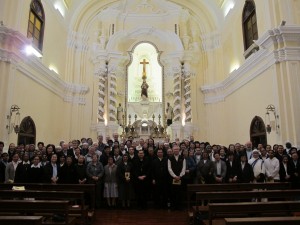
The second celebration took place in the Seminary building. The liturgical celebration was held at the beautiful Seminary Chapel and included the following activities: common recitation of the evening prayer of the day, the adoration of the Blessed Sacrament and the prayer of the Act of Consecration to the Immaculate Heart of Mary. The prayers, psalms, songs, and the brief and meaningful sharing of Bishop Jose centered on the World Day of Consecrated Life. About 140 religious women and men, including 18 Dominican sisters and brothers, took part in the liturgical celebration carried out in Chinese and English: nearly one hundred were women and over forty, men. This was most probably the biggest gathering of religious women and men in Macau so far. After the prayers, we all had a simple and plentiful dinner. The general comment on this powerful spiritual happening was: it was really meaningful and beautiful, a true agape that must be repeated – and not only on the Day of Consecrated life! (FG)
Â
Â
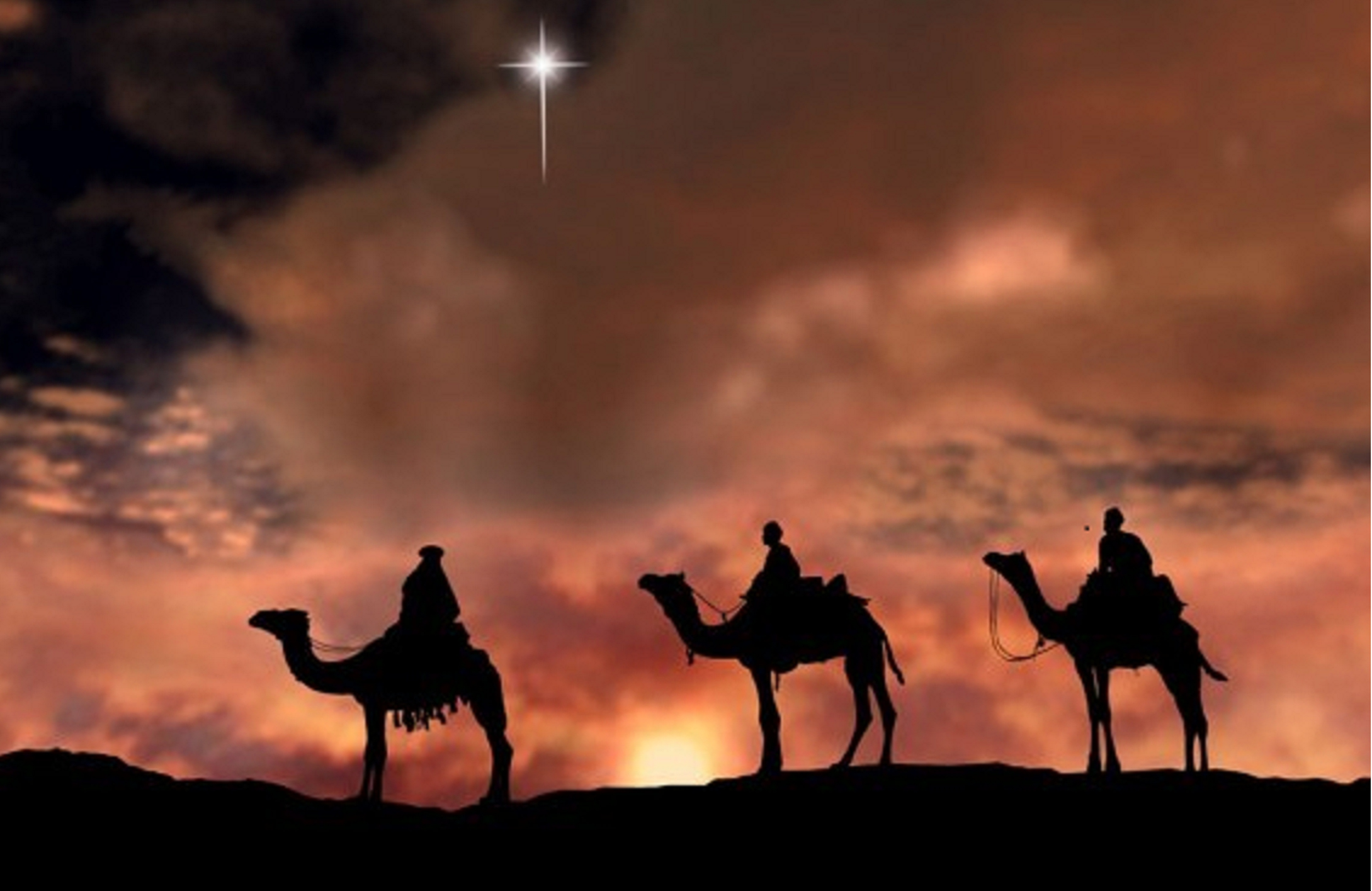
Dear Brothers and Sisters in Christ!
Today we celebrate the solemnity of the Epiphany popularly known as the feast of the Three Kings. Today we commemorate the coming of three wise men from the East who followed the Star that appeared and led them to where the Child Jesus was. According to tradition, they sought this new born king and paid homage to him.
 While in the Eastern Churches the Epiphany celebrates the triple manifestation of Christ, as the baby adored by the Magi, his baptism at river Jordan and the first miracle he performed at the wedding feast at Cana… true manifestations of Christ’s mission and his double nature as man and as God. Today in the Latin Church, it can be said to be one of the highlights of the Christmas celebration: Christ manifests himself to all for he is one only the Messiah of the Jews whom they have waited; but also the Savior and Redeemer of the gentiles.
 While making the reflection of today’s homily, I found myself remembering one of my favorite books and writers which helped shape my outlook in life and my ministry. He was the famous philosopher/psychiatrist Viktor Frankl and his seminal work Man’s search for meaning. I suppose some of you have read the book and if not I believe and I would like to invite you to read this book at least once in your life. Dr. Frankl was a famous Jewish doctor and psychiatrist who lived in Vienna, due to his race he was arrested by the Nazis and was sent to the concentration camp where he lost everything, his loved ones, his career and his future. Fortunately he survived and his experience in the concentration camp as well as his observations of his co –inmates led him to make some startling conclusions which differed to many thinkers, philosophers, psychologists of his time. According to his observations, when man is stripped of everything even his self worth and humanity, the one thing that would give him strength to continue and live through all trials is to seek meaning in everything. This would finally lead to a transcendent reality as the source of meaning and eventually a life force. Though this may be too simplistic to present the ideas of this great man of the past century, in contrasts to the nihilists and the existentialists of pre and post war era, Frankl believes that this search for meaning is the very life source of our existence.
 This search for meaning, the search for the truth and the search for wisdom is man’s lifetime quest. Because the possession of meaning, truth becomes the source of fulfillment and happiness for man: the motor that drives men to be.
 But what does Frankl have to do with today’s feast? The wise men from the East symbolized man’s search for meaning… these wise men sought meaning in their ancients runes and texts, they deciphered the stars and the constellations… they could not find what they were looking for except signs of manifestations of what they might be looking for… When the star appeared.. they left everything to follow where the star led them, they went beyond the normal course of their lives to find out where this star is going to lead them to… perhaps a secret they have seen looking for, perhaps the key to open doors. With so much excitement and enthusiasm from their part, when they arrived in Jerusalem, they were surprised, better they were shocked that the Jews themselves did not know the sign nor the birth of a king… the city was filled with fear, and Herod even had to ask the scribes and the scholars as to the veracity of the foreigners’ tale. Despite the incredulity and indifference of the city dwellers, they continued their journey, following the star which led them into the small town of Bethlehem of Judah.
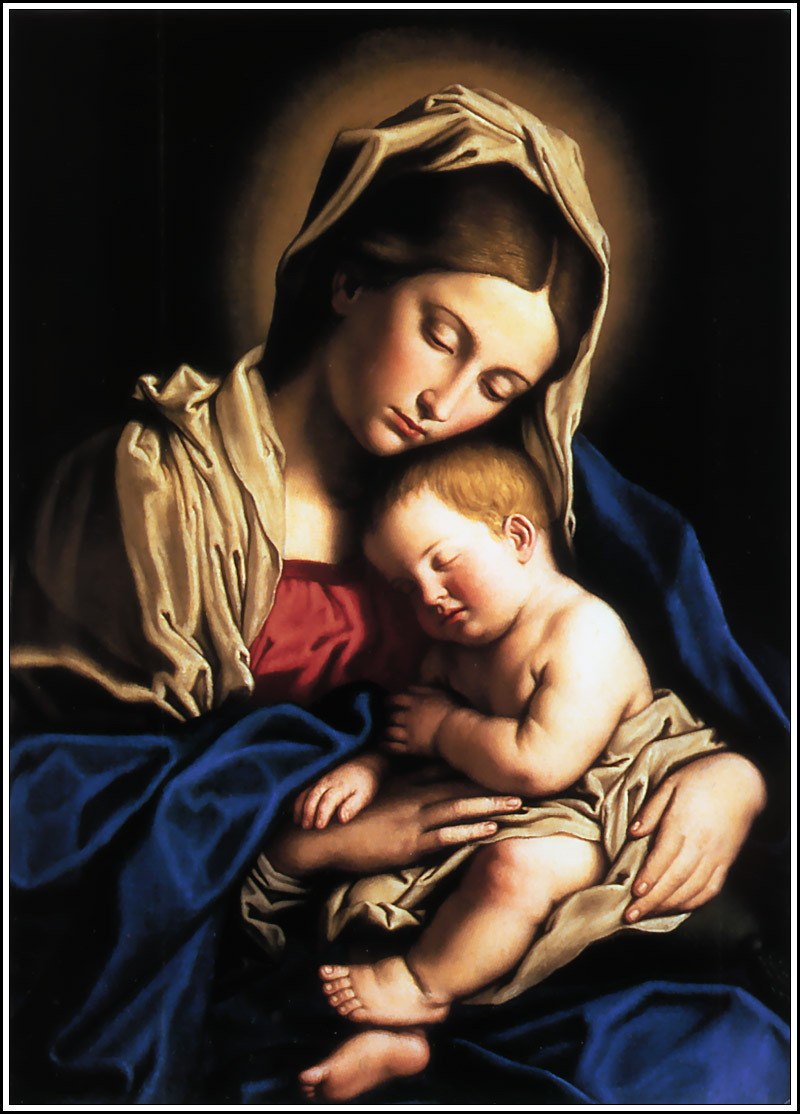 What did they find? They did not find a boy in his royal raiment, pronouncing words of wisdom, or a pampered prince amidst the luxury and ministrations of slaves and servants. What they saw was a baby in the arms of his mother… a child so normal, so ordinary, so tiny, so vulnerable and so weak before them. It is in this baby in the arms of his mother where they found what they were looking for. It is a wisdom and truth not found in books or from the musings of great minds but it is the love that has become flesh. This baby in the arms of his mother, in the poverty of a small Bethlehem home teaching them the novel logic and paradigm of the Gospel which is love. He tells them that what they seek can only be found if one becomes like a child again, to live by finding the true meaning of our humanity which is graced by His incarnation. It is our capacity to love and to live for others.
What did they find? They did not find a boy in his royal raiment, pronouncing words of wisdom, or a pampered prince amidst the luxury and ministrations of slaves and servants. What they saw was a baby in the arms of his mother… a child so normal, so ordinary, so tiny, so vulnerable and so weak before them. It is in this baby in the arms of his mother where they found what they were looking for. It is a wisdom and truth not found in books or from the musings of great minds but it is the love that has become flesh. This baby in the arms of his mother, in the poverty of a small Bethlehem home teaching them the novel logic and paradigm of the Gospel which is love. He tells them that what they seek can only be found if one becomes like a child again, to live by finding the true meaning of our humanity which is graced by His incarnation. It is our capacity to love and to live for others.
The wise men sought and found what they were seeking, perhaps more than what they were expecting as they not only found a king, a sage but found the God of love becoming man. The light of truth that lighted their path to Bethlehem has led them to find love. That is why they were not there to speculate the “whys†or the “howsâ€, before the mystery of love they could only bend their knees to adore, to contemplate and the experience the love that is being manifested before them. Perhaps the magi also experienced what Frankl had so beautifully said:
The truth–that love is the ultimate and the highest goal to which man can aspire. Then I grasped the meaning of the greatest secret that human poetry and human thought and belief have to impart: The salvation of man is through love and in love. I understood how a man who has nothing left in this world still may know bliss, be it only for a brief moment, in the contemplation of his beloved. … For the first time in my life I was able to understand the meaning of the words, ‘The angels are lost in perpetual contemplation of an infinite glory.’
 My brothers and sisters, while men and women today continue to seek the meaning of their existence, Jesus Christ has appeared to us, to meet us in our journey and to give us the answer to what we are searching for. Today Jesus manifests in the most wonderful manner God’s way of love, through the incarnation. Through this act of becoming man, he indeed has bestowed upon us salvation and from our brokenness gave us redemption. Just as man has nothing else left except his own poverty, Christ’s coming, his birth is indeed an EVENT: a source of peace, of immeasurable joy and of hope.
 Our search is over, the light of that bright star has led us before His presence, we are invited to learn from the child Jesus the path of true holiness and Christian fraternity, the royal way of love which He has given his own life as the most eloquent example. Only by following his example of humility, of self-giving can we truly find the meaning of our lives as persons. Like him to live and to die for others. Here before the child Jesus in the arms of his mother, we too bend our knees in humility, we offer him gifts, not of gold, myrrh and frankincense, but something more valuable, something more personal, ourselves, our dreams, our projects our weaknesses and our foibles. Like the magi, we can just adore and contemplate the mystery before us… before him, logical acrobatics or philosophical musings are suspended, only the gaze of loving contemplation is enough….
 As we live in times of living dangerously, of uncertainty and seeming desolation, of hopelessness and indifference, may the star that shines in the darkness of our daily existence, —Jesus, shine a glimmer of hope for all men and women, to lead them to Himself and to experience His love as a source of true salvation and redemption. May our daily witnessing of our faith, our day to day experience of God’s abundant love for man, reflect that light leading them to Jesus and that our actions of love, of forgiveness, of solidarity with the poor and the marginalized, our committed to Gospel values enable them to experience the warmth of true Christian love. So that all of us men and women of goodwill can heed the Christmas invitation: Come let us adore Him, Christ the Lord for your birth is our peace!
In the name of the Father, and of the Son and of the Holy Spirit. Amen.
Fr. Jarvis, O.P












